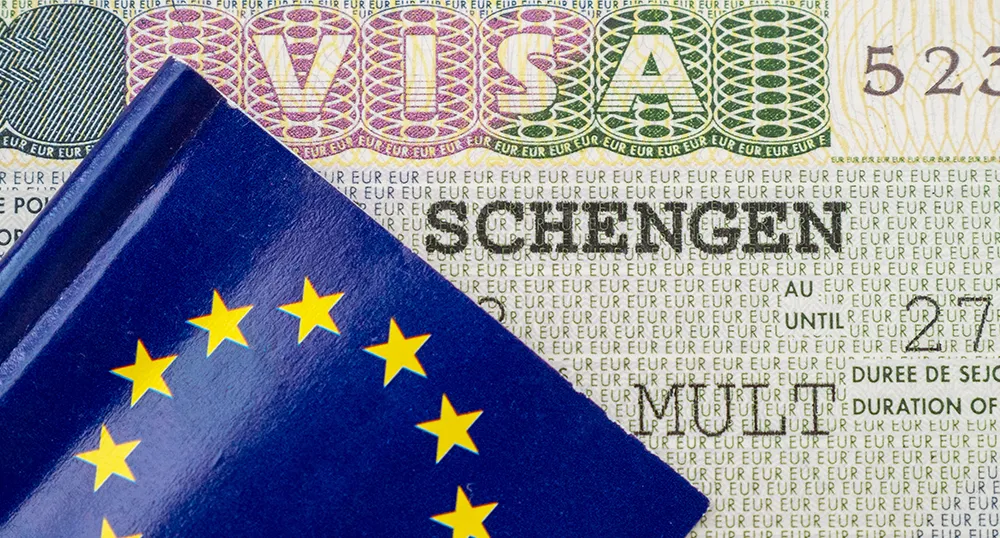What is a Schengen Visa and Do I Need One?
Travel Team | Apr 1, 2024

If you’re visiting multiple countries in Europe, you may need a Schengen visa. Keep reading to learn more about the Schengen Area and if a Schengen visa is required for your travel.
What Is a Schengen Visa?
A Schengen visa is a temporary stay visa that allows you to travel to any member of the Schengen Area for up to 90 days for tourism or business purposes.
The Schengen Area is a group of 29 European countries that have abolished passports and all other types of border control at their mutual borders. The area is named after the 1985 Schengen Agreement.
There are no border controls between member states, and free movement of people is allowed. This makes traveling within the Schengen Area very convenient, as you do not need to present your passport or go through customs when traveling from one Schengen country to another.
Which countries are valid for a Schengen visa?
 The Schengen Area currently consists of 29 member states: Austria, Belgium, Bulgaria, Croatia, Czech Republic, Denmark, Estonia, Finland, France, Germany, Greece, Hungary, Iceland, Italy, Latvia, Liechtenstein, Lithuania, Luxembourg, Malta, Netherlands, Norway, Poland, Portugal, Romania, Slovakia, Slovenia, Spain, Sweden, and Switzerland.
The Schengen Area currently consists of 29 member states: Austria, Belgium, Bulgaria, Croatia, Czech Republic, Denmark, Estonia, Finland, France, Germany, Greece, Hungary, Iceland, Italy, Latvia, Liechtenstein, Lithuania, Luxembourg, Malta, Netherlands, Norway, Poland, Portugal, Romania, Slovakia, Slovenia, Spain, Sweden, and Switzerland.
Bulgaria and Romania are the newest countries to the Schengen Zone, being added in March 2024.
What Are the Four Types of Schengen Visas?
There are four types of Schengen visas: Type A, Type B, Type C, and Type D.
Type A Schengen visas are intended for airport transit only. This means you cannot leave the airport's international zone with this visa.
Type B Schengen visas are intended for short stays in the Schengen Area of up to 90 days.
Type C Schengen visas are intended for extended stays in the Schengen Area of more than 90 days.
Type D Schengen visas are intended for multiple entries into the Schengen Area over a period of time.
For types B, C, and D, you can travel freely within the Schengen Area for business, tourism, or family visits.
Who Is Eligible for a Schengen Visa?
There are a few requirements that you must meet to be eligible for a Schengen visa:
- You must have a passport that is valid for at least three months beyond the planned date of your trip.
- You must have proof of sufficient funds to cover your expenses while in the Schengen area. This can be in cash, traveler's checks, or a letter from your bank.
- You must have proof of travel insurance that covers medical expenses and repatriation in case of emergency.
- You must have a hotel reservation or other proof of accommodation in the Schengen area.
- You must have a round trip reservation or itinerary showing when you plan to enter and exit the Schengen area.
- You must have a Schengen visa application form, which you can get from the embassy or consulate of the Schengen country you are planning to visit. Two recent photos – taken within the last three months – must be attached to the application.
Who Needs a Schengen Visa?
 Whether you need a Schengen visa depends more on your country of residence than your destination.
Whether you need a Schengen visa depends more on your country of residence than your destination.
- If you are a citizen of a Schengen Area member country, you can cross the international borders without any border checks as if it were just one country.
- If you are a U.S. citizen with a U.S. passport traveling to the Schengen countries for tourism or business, you will not need a visa as long as you spend 90 days or less in these countries. Under this agreement, you may enter the Schengen area as long as your stay does not exceed 90 days within a six-month period.
- Residents of other countries should check this list to see if they are required to get a Schengen visa. It’s important to note that you may need a Type A Schengen airport transit visa to change planes in an airport in a Schengen Area country.
Even if you do not need a Schengen visa, your passport must be valid for at least three months past your date of departure if you are planning on entering one of the 27 European countries in the Schengen Area.
You may also need travel authorization through ETIAS — the European Travel Information and Authorisation System — which aims to improve security throughout Europe. The ETIAS visa waiver is mandatory for residents of the United States, among other countries.
Most countries assume all travelers will stay for three months for visa-free visitors. It is recommended that U.S. citizens traveling to these countries:
- Have at least six months validity on their passport whenever they travel abroad.
- Check the expiration date on their passport carefully before traveling to Europe.
- Carry their passport with them at all times.
How long is a Schengen visa valid?
 Schengen visas are generally valid for 90 days from the date of issuance. However, some Schengen countries may issue visas for less than 90 days.
Schengen visas are generally valid for 90 days from the date of issuance. However, some Schengen countries may issue visas for less than 90 days.
Make sure to check the validity of your Schengen visa before traveling. If your visa is valid for less than 90 days, you may be able to extend it once you are in a Schengen country.
Check with the local authorities to see if this is possible. Schengen countries may also issue visas valid for multiple entries, meaning you can enter and exit the Schengen zone multiple times during the validity of your visa.
How Much Does a Schengen Visa Cost?
Schengen visa fees vary depending on a few factors, such as your country of citizenship and the purpose of your travel. Generally speaking, however, most people can expect to pay around 60 EUR for a Schengen visa.
Citizens of certain countries (including the United States) may be required to pay an additional “reciprocity fee” on top of the standard Schengen visa fee. This fee is intended to match the cost of a Schengen visa for citizens of that country who wish to travel to Europe.
The Schengen visa fees are as follows:
- Standard visa application: 80 EUR
- Schengen visa for children between 6 and 12 years old: 40 EUR
- Schengen visa for children under 6 years old: Free
- Reciprocity fee (if applicable): Varies depending on country of citizenship
Please note that these are only the standard Schengen visa fees as of February 2024. You may be required to pay additional fees if you submit additional documentation or attend an in-person interview.
Schengen visa fees are non-refundable, so it is essential to ensure that you meet all the requirements before submitting your application.
How Do I Apply for a Schengen Visa?
 You must apply for a Schengen visa at the appropriate embassy or consulate of the country you intend to visit. If you plan to visit more than one country in the Schengen Zone, apply at the consulate of the country where you will spend the most time.
You must apply for a Schengen visa at the appropriate embassy or consulate of the country you intend to visit. If you plan to visit more than one country in the Schengen Zone, apply at the consulate of the country where you will spend the most time.
Additionally, various Schengen visas can be issued, such as a Uniform Schengen visa, limited territorial validity visas, and national visas. You can read more information here about the different Schengen Visa Types.
To apply for a Schengen visa, you must have a valid passport, a recent photograph, a completed and signed visa application form, and additional documents related to your stay such as evidence of accommodation. If you are applying for your first Schengen visa, you must also submit your fingerprints.
Make sure you have everything you need by contacting the embassy or consulate or reviewing this list of required documents and fees for a Schengen visa.
Why would a Schengen visa application be denied?
There are a few reasons why Schengen visa applications can be denied. Your application will be denied if you don't have the required travel documents, sufficient money to support yourself during your stay, or medical insurance.
Additionally, if you have a criminal record or have been denied a Schengen visa in the past, your application may be denied.
Finally, your application will be denied if you are considered a security risk to any Schengen country.
Do I Need Travel Insurance to Visit the Schengen Area?
Anyone required to obtain a Schengen visa must have travel insurance in one of the Schengen member countries.
Insurance requirements for traveling to the Schengen Zone
- Coverage for urgent medical attention and/or emergency hospital care or death
- Benefits for repatriation for medical reasons
- A plan maximum of at least 30,000 EUR
- Valid for the entire Schengen Area and effective throughout your stay
Confirm with the embassy or consulate through which you apply for your visa about specific travel insurance requirements.
Questions about Travel Insurance
To learn more about travel insurance for your international trip, check with your travel insurance agent or contact our sales team.
Travel Like a Pro with The Wayfinder
Did you enjoy this blog? Get more articles like it before anyone else when you subscribe to our monthly newsletter, The Wayfinder.
Sign me upSearch Posts
Receive our monthly inspiration and travel tips from the travel insurance experts.
Sign me upThis website and various social media updates provided by Seven Corners contain content, information, articles, videos, and links to websites created by third parties. Seven Corners, its owners, and its employees neither endorse nor are responsible for the accuracy, timeliness, or reliability of any third-party information, statements, opinions, or advice and are not liable for any loss, harm, or damage caused by your reliance upon them. Use of such information or the linked websites is entirely at your risk. Concerns regarding this third-party content should be directed to the third party. Seek professional advice, as appropriate, regarding your use of such information and websites.
Because the information on this website and in Seven Corners’ blogs and other social media is written and compiled using knowledge and information available at a certain point in time, it may become outdated. For that reason, information, events, legal requirements, and product changes (including benefits, limitations, exclusions, and services) may not be up-to-date, complete, or accurate at the point in time it is being read. Again, use of such information is at your risk.
